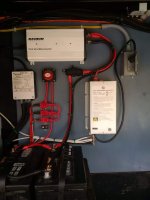I just finished my 12 volt wiring. I didn't run the converter through a circuit breaker on the 12 volt positive side. I know it ran backwards through the circuit breaker when it was mounted behind the basement wall but I don't think the circuit breaker really does anything since there are 40 amp fuses in the converter?
Anyone see any issues?

Thanks
Anyone see any issues?

Thanks
